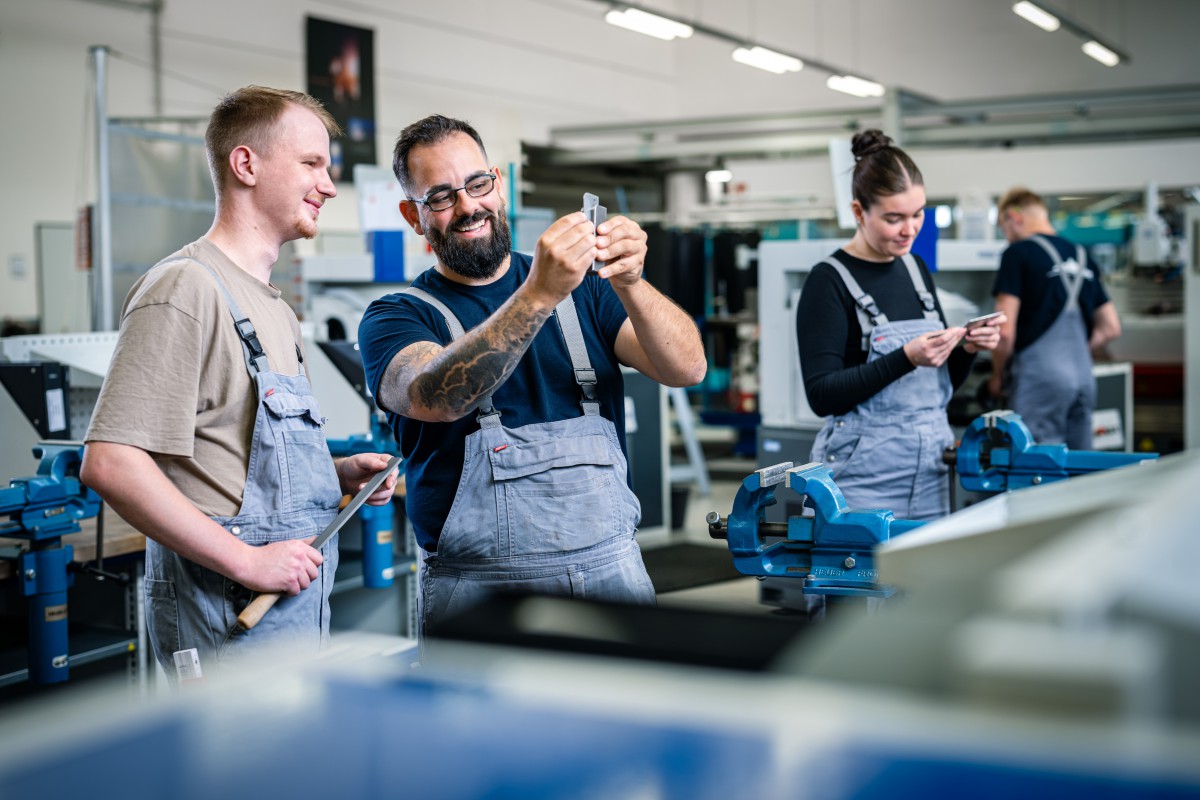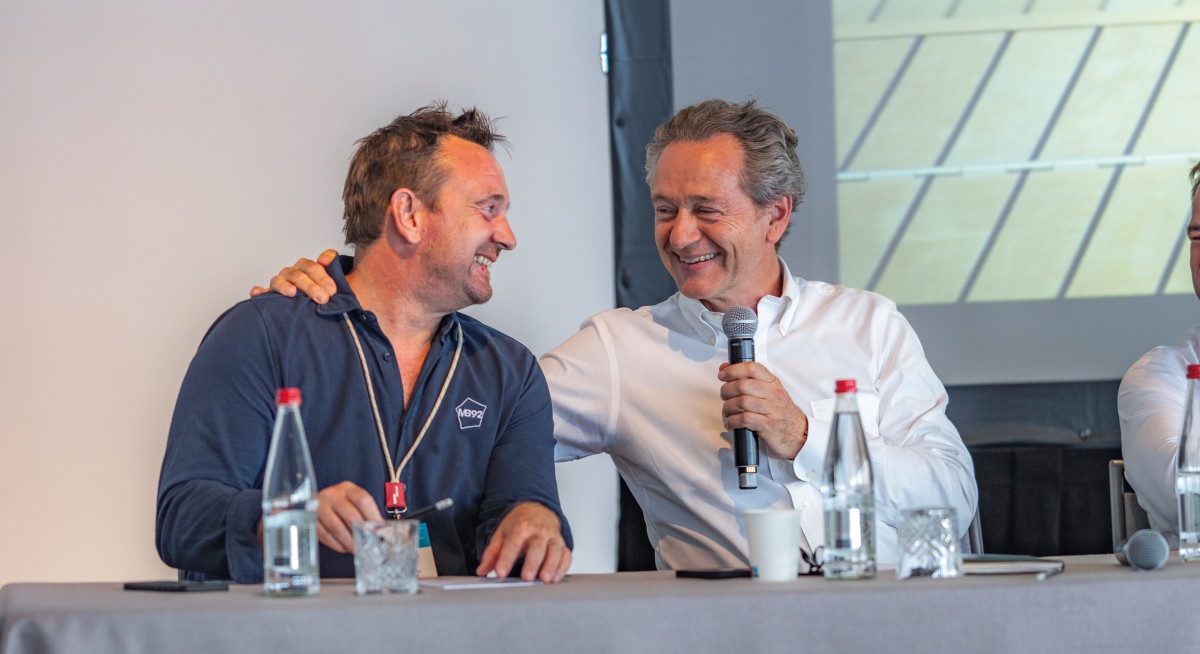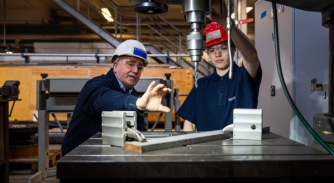‘We are nothing without the people at our shipyards’
With young people increasingly drawn to digital careers rather than hands-on work, how can we inspire the next generation to fill the ever-increasing skills gap in yacht building and repairs?

Initiatives at Lürssen, which employs around 1,800 artisans. The expertise needed to build and refit projects at such a high standard takes years of specialised training. Image: © Timo Lutz Team fuer-Industriefotografie
Depending on from which side of the Atlantic you get your news, the outlook for the next generation picking up tools and dedicating their careers to trades is not just nuanced, it’s polarised.
The Wall Street Journal captures an optimistic view of the US. Describing Gen Z as the ‘Toolbelt Generation’, it reports a significant uptick in enrolment. Students studying construction trades, it writes, have risen by 23 per cent, and those enrolled in vocational-focused community colleges are up by 16 per cent. This isn’t the reality in Europe.
Open any national statistic and the outlook is dreary. Leading statisticians Statista, for one, reported that around 70 per cent of EU countries experienced labour shortages in 2022. Bricklayers were in the shortest supply, followed closely by welders and pipefitters – the backbone of shipbuilding.
Germany, in particular, faces a severe shortage of qualified workers. The nation relies heavily on skilled artisans. Three of the largest automotive companies – Volkswagen, BMW and Mercedes-Benz – together employ just over 1 per cent of the nation’s population, with more than a million craftspeople.
In our industry, there are more than 70 shipyards for yachts in Germany, 26 of which offer refit services. This includes Lürssen, one of the leading shipbuilders, which operates three shipyards in northern Germany, employing around 1,800 artisans. The expertise needed to build and refit projects at such a high standard takes years of specialised training.
Maintaining high levels of craftsmanship across all sectors is a troublesome and ongoing challenge. Two issues compound the problem: more than a fifth of the population is over 65 and retired, while enrolment in apprenticeship programmes has nosedived year-on-year. Despite Germany being at the forefront of vocational education for decades, apprenticeship schemes are still losing traction. According to the German Federal Employment Agency, vacancies have more than trebled in the past two years. In 2022, around 69,000 apprenticeship positions went unfilled, and as of July this year more than 200,000 positions remain open.
“I personally believe that in Western Europe there is an overemphasis on university education. Artisanal jobs are underappreciated, and there is a misconception about the trade’s earning potential.”
When recruitment came up in discussion at the International Superyacht Society Leadership Conference, the atmosphere thickened with frustration. “There is a real problem,” said Alberto Perrone Da Zara, director sales yacht refit at Lürssen, raising his concerns from the panel. “We are starting to miss the skills of young labour. There are simply too few skilled craftsmen, and we need to do something about it. We need to go into schools, bring students to our shipyards, and educate them about the joys of shipbuilding and the excellence of our craft.”
Lürssen is doing just that. After forging links and partnerships with local universities, the company welcomes around 45 apprentices each year. A concerted effort is underway to develop ties further and establish new partnerships and initiatives. One such programme is The Lürssen Foundation, a joint project between its facilities in Germany and Croatia.
The Lürssen Foundation, established in Rijeka in Croatia, is a new initiative that aims to become a central hub for sustainable innovations. Part of its mission is to inspire the next generation of engineers keen on dedicating their practice to advancing green transition and digital transformation in the maritime field. It will foster an environment of knowledge-sharing and learning through hands-on experiences, expert mentorship and impactful research projects. While this isn’t artisanal craftsmanship per se, the Foundation’s commitment to upskilling and career development will be a positive force, both regionally and internationally.
In Germany, Lürssen regularly hosts open events at its new-build and refit shipyards to welcome and inspire the next generation of artisans. Each year, the Day of the Apprenticeship attracts around 30 visitors, who are given a tour of the facilities and insights about the fascinating trades required to build and maintain such complex yachts. Annually, Lürssen also invites its employees’ children for an exclusive experience and tour.
Perrone Da Zara stressed the importance of these recruitment drives. “We are nothing without the people at our shipyards,” he said. “We can sell all we want, but if we go home and there is nobody in the kitchen, it would be an ugly scene.”
Germany is not alone; Europe and most countries are experiencing the same downward trajectory in enrolment. In the UK, apprenticeship enrolment has fallen by 34 per cent over the past decade; more than half a million students joined apprenticeship programmes in 2015, but only around 300,000 enrolled last year.
This decline might have hurt most industries, yet Pendennis, the UK’s largest refit and rebuild shipyard, has remained unscathed. It bucks the trend with its notably successful apprenticeship programme which has run for more than 25 years. The Cornish shipyard recruits around 30 new apprentices each year, many of whom grow within the company to become project management and senior staff. In-house training is enmeshed in the yard’s DNA, and it’s a point of pride.

(l-r) Rob Papworth, managing director, MB92 La Ciotat, and Alberto Perrone Da Zara, director sales yacht refit, Lürssen, at
the International Superyacht Society Leadership Series in Monaco earlier this year.
After a quick chat with Paul Griffiths, sales manager at Pendennis, I soon discovered that competition is actually quite fierce. They receive more applicants for their apprenticeship schemes than they can recruit. Their success lies in years of investment and in placing learning and development at the heart of their operations.
In the South of France, MB92 La Ciotat is just as committed to in-house training programmes. However, despite recruiting many apprentices each year, retention remains an issue. “We take on around 20 apprentices each year, and roughly half move on to other jobs,” says Rob Papworth, managing director at MB92 La Ciotat. “They become quite attractive once trained. This goes for all shipyards – Lürssen, Feadship, Oceanco and others. But this is not the main challenge around skills.”
The real challenges, according to Papworth, are societal. “I personally believe that in Western Europe there is an overemphasis on university education,” he explains. “Artisanal jobs are underappreciated, and there is a misconception about the trade’s earning potential, which is a real shame. Many shipyards offer competitive salaries, comparable to those of university graduates, and I think some of the refit guys are making pretty good money.”
Artisanal craftsmanship is in the midst of an identity crisis throughout Western Europe – and young tradespeople from Eastern Europe are seizing the opportunity. “We see many very skilled people who started training as young as 15 coming from Poland, Romania or elsewhere,” says Papworth. “They look young, yet can weld like the best you’ve seen. This is because they invested in training and completed an apprenticeship early on. That level of craftsmanship is now rare in the UK and Western Europe.”
The data backs this up too. According to Parliamentary statistics, nearly half of all apprentices enrolled in 2022-2023 in the UK were aged 25 or older, many of whom likely already hold a university degree. These later starters to learning skilled trades are competing against exceptional craftsmanship from their Eastern European contemporaries, who have amassed a decade of experience through apprenticeship schemes and an early commitment to their trades. For shipbuilders, the choice is clear.
Stefan Coronel, managing director at HUISFIT by Royal Huisman, raised another interesting point during the ISS conference. The Dutch refit yard runs a streamlined and efficient operation, relying on external teams and agencies for skilled labour. He naturally then challenged where the onus for learning and development should lie. “I agree wholeheartedly that we’re starting to miss the love for labour. In our region [the Netherlands], there is a close-knit network of suppliers who have their own craftspeople and are independent of one another.”
Italy has approached this challenge differently, creating a web of training institutions. With approximately 70 of the 240 yacht shipyards in the country offering refit services, demand for labour in the sector is colossal. Matching skills with demand remains an ongoing puzzle and has led to the establishment of several important academies.
The Netherlands, with its rich heritage of shipbuilding and repair, is densely populated with shipyards. Including everything from small yards to large commercial operations, the small nation has approximately 400 shipyards – a staggering four-to-one ratio compared to its number of cities. It’s a haven for sub-contractors. Many yards in the Netherlands rely on these floating, highly skilled pools of labour. They also rely on each other, and requests for section work or facility space are not uncommon. Refit and rebuild
specialist Balk Shipyard, for one, has brought numerous aluminium sections to life for neighbouring new-build yards such as Feadship and Heesen.
Italy has approached this challenge differently, creating a web of training institutions. With approximately 70 of the 240 yacht shipyards in the country offering refit services, demand for labour in the sector is colossal. It dwarfs that of every other European country. Matching skills with demand remains an ongoing puzzle and has led to the establishment of several important academies.
Major shipyards dotted along the boot-shaped coastline have each established their own centres, fostering cultures of learning and development. These academies provide learning opportunities at all levels and have proven popular – and successful.
In the US, despite the Wall Street Journal’s optimistic outlook, recruiting the right skills for yacht refit and repair is a huge challenge, according to Norina Edelman, CEO at International Marine Management. “It’s a global issue,” she says. “Young people are simply less interested in manual work. However, that being said, the US is interesting right now because yacht refit is a new thing.”
Edelman mentioned two new refit facilities at the ISS conference: Puerto Rico and Guadeloupe. The former was established just last year and is underway with a $15 million investment to develop San Juan Yacht & Ship into a comprehensive operation. Thousands of jobs are expected to be generated from the project, including welders, electricians, plumbers and carpenters.
“People are excited about the opportunity to learn a trade,” adds Edelman. “However, training takes time. Some skills we can teach on-site but others require years of practice. Our approach blends intensive training for people eager to weld or work in other trades with more experienced hires.”
Across the globe then, there is work, and with advancements in design and innovation, learning and development have never been more important. But how do we inspire the next generation to pursue artisanal craftsmanship?
“The challenge is money,” said Ed Ewer, CEO of shoreside superyacht recruitment firm SYR. “The big money for young people these days is in IT, coding, web design, creative digital jobs, etc., and if you want to earn maximum income, you need to get a degree. You then also have the crypto guys who are just 18 or 19 and successful, already bought the house and fast car. Societal pressure is huge on young people.”
The desirability of digital careers over hands-on work is immense. It’s an uphill struggle for shipyards and recruiters, who must compete against enviable lifestyles often promoted through social media. To overcome this, the positives of what the industry can offer, along with the pride of the craft, need to be well promoted. Every region may have its distinctive challenges but the responsibility is shared equally to inspire appreciation for the joys that shipbuilding and yacht repairs can offer.
This article first appeared in The Superyacht Report – Refit Focus. With our open-source policy, it is available to all until the end of November by following this link, so read and download the latest issue and any of our previous issues in our library.
NEW: Sign up for SuperyachtNewsweek!
Get the latest weekly news, in-depth reports, intelligence, and strategic insights, delivered directly from The Superyacht Group's editors and market analysts.
Stay at the forefront of the superyacht industry with SuperyachtNewsweek
Click here to become part of The Superyacht Group community, and join us in our mission to make this industry accessible to all, and prosperous for the long-term. We are offering access to the superyacht industry’s most comprehensive and longstanding archive of business-critical information, as well as a comprehensive, real-time superyacht fleet database, for just £10 per month, because we are One Industry with One Mission. Sign up here.
Related news

Leading from below
Phil Richards, ex-engineer and technical recruiter at Lighthouse Careers, on the relevance of leadership training and development for engineers
Opinion

A pledge for the next generation
The ISS has a new programme designed to attract, retain and develop the next generation of yachting professionals and create opportunities for emerging talent
Crew

Yacht crew issues expose commercial sector gaps
ISWAN's data highlights urgent need for industry reform and better support systems, so what can the industry do to help?
Crew
.jpg)
Beyond the basics
Is the quality of crew training keeping pace in an ever-evolving technological landscape?
Crew

Building the next generation
Pendennis has been running an apprenticeship scheme for over 25 years, forming the bedrock of its experienced team of employees
Crew
Related news
Leading from below
6 months ago
A pledge for the next generation
7 months ago
Yacht crew issues expose commercial sector gaps
8 months ago
Beyond the basics
8 months ago
Building the next generation
9 months ago
NEW: Sign up for
SuperyachtNewsweek!
Get the latest weekly news, in-depth reports, intelligence, and strategic insights, delivered directly from The Superyacht Group's editors and market analysts.
Stay at the forefront of the superyacht industry with SuperyachtNewsweek



